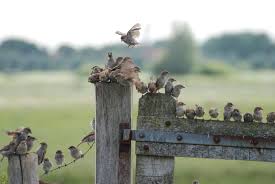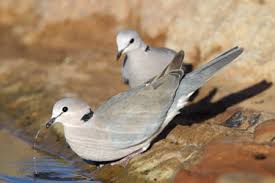"FREMONT
--
For nearly two years, BART has been involved in an exhaustive effort
to shoo away hundreds of pesky birds laying eggs along the rail
extension under construction toward Silicon Valley -- even installing
those inflatable dancers popular outside used-car lots.
 |
| Our DNA says rest here (sparrows) |
The cost to taxpayers: $5 million -- or more than $17,000 per nest. But
BART says it's money well spent. Agency officials say the bird-related
problems would have delayed BART's extensions to Warm Springs and San
Jose, costing much more public money in the long run if its contractors
hadn't spent millions of dollars in overtime to stay on schedule.
....
With the project site sitting
along the route birds fly to migrate south, mallards, sparrows, doves
and several other species flock to the lush, wooded area to lay eggs,
which is a problem since most species of migratory birds legally can't
be disturbed once settled in the nest. They kept coming back, no matter
what the workers did -- and they tried just about everything, from
installing sprinklers and nets to physically destroying the nests and
separating bird couples before they could mate and lay eggs."
 |
| Yes, all of you out! (mallards) |
....
The construction contract,
awarded to builders Shimmick Construction and Skanksa for $137 million
in 2009, has since increased $11 million because of the extra bird costs
and other changes. The subway, which is virtually done now, is
part of an $890 million, 5.4-mile extension into the Warm Springs
district of south Fremont, which is expected to open in 2015. It's the
first leg of a rail line slated to reach Milpitas and San Jose's
Berryessa neighborhood by 2018.
 |
| We were here last year (doves) |
Wildlife problems have plagued BART before when building rail line extensions.
When
constructing the Peninsula line toward San Francisco International
Airport early last decade, crews discovered a dead San Francisco garter
snake -- an endangered species -- which briefly delayed work and cost
BART more than $1 million. Medved said while a few eggs did crack
during the Fremont project, this time the agency avoided any work
stoppages and was not fined by state regulators."
Read more.
Related -
BART Warm Springs project. And
San Francisco Chronicle/CBS, 3/13/12, "San Jose BART extension starts work in April."
The Cornell Lab of Ornithology, "All about Birds/Migration." "The origins of long-distant migration patterns are more complex and include the development of the genetic make-up of the bird."
Posted by Kathy Meeh


2 comments:
unless they are going to extend Bart to Linda Mar, this has nothing to do with Pacifica
"...nothing to do with Pacifica" Anonymous 7:54 AM
Well here you are again. Why do you care? I hear you only vote in Lake Tahoe. But, aren't you the same guy who submitted a series of city bankruptcy articles (and fear of city bankruptcy articles) from all over California, Nevada, and and anywhere else in the United States?
Progress anywhere requires some wildlife protection, and also has it casualties. Then there is the cost. Most of the money to build Bay Area BART, including this extension, is paid by government (Federal and State). Assuming you pay taxes, that means you are paying for this Bart extension at least 2X.
Protection of wildlife (including endangered species) is an evolved concept and a legal consideration. Example, breaking news, the local three year Sharp Park Golf Course environmental lawsuits are resolved. Very expensive for all concerned, but resolved.
Such regional issues affect all of us, including our thinking. We live in a city that is concerned about environmental and species protection, but we also need economic progress.
Post a Comment